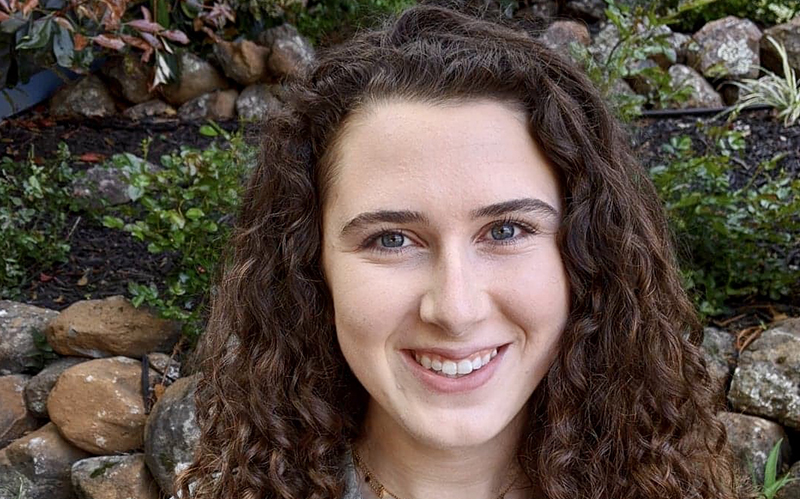“I’ve learned such a lot from ACE about how research works and how to go through the research process. I’ve learnt you can’t always trust every result; you have to make sure that you can prove it” says Kenna Sherman.
Congratulations to Kenna Sherman who has just been accepted at Johns Hopkins University to do a PhD in genetics!
Kenna is about to graduate with a degree in biology from the University of California Santa Barbara and for the past 2 years has been supported by ACE through an internship with Dr Amy Boddy. When Kenna began university, she had no idea of the direction in biology where her interest would lie but suspected it would be neuroscience. That changed when she began working with ACE. She is now determined to become a cancer researcher.
“Definitely. That’s what I want to go into. The program that I was accepted into at Johns Hopkins is human genetics and I hope to focus on cancer, which is pretty much exactly what I’ve been doing with ACE. I just think it’s really interesting that your genes are so important in deciding if you’re going to get cancer. And then looking across the species and seeing how, for instance, elephants get cancer much more infrequently than humans and knowing exactly why and how that is. Then asking the question, ‘Can we use that to fix human cancers? I think that’s just fascinating!”
She chose Johns Hopkins for her PhD because they make the relevance of research very real to the students.
“I really liked their program. It’s very focused on clinical research and they actually let you go into the clinics so you can see the effects of the treatments you’re developing, how they’re helping people. And the main reason I want to do biological research is to make treatments to help people. So, I really liked that about the program.”
Here at ACE we will all miss Kenna. She has been an invaluable undergraduate researcher. Her first project with Amy Boddy was visiting the zoo at Santa Barbara and sifting through all their autopsy data to identify the rate of cancer across the full range of animal species in their collection.
“It was really cool, because we found pretty much the same rates of neoplasia in the animals in Santa Barbara zoo, which had a really small database, as we found in the much larger data base managed by ACE. One really fascinating thing we discovered is that cancer in flamingos is very rare.” But then in domestic rabbits, white tree frog, ring tailed lemur and San Clemente Island fox, it was very common. In fact, nearly 40% of the rabbits died of cancer.”
Kenna and Amy then delved more deeply into the life history traits of the animals such as their growth and reproductive ages and the size of their litters and they confirmed that bigger, longer lived animals do not get more cancer. Indeed, this work supports Peto’s Paradox, the observation made by the Oxford epidemiologist, Richard Peto, 40 years ago, that the number of cells in an animal (roughly, their size) doesn’t correlate with their likelihood of them developing cancer
Kenna’s project at the moment with ACE is looking at genes that are quite commonly mutated between species and so code for slightly different proteins. She made a list of these genes and then compared them to the data base of the Cancer Gene Census (COSMIC), which lists the mutations that have been implicated in human cancer.
“That gave us some really interesting results, including a gene important for sensing DNA damage and signaling for DNA repair. It is evolving faster in some mammals. And so that led me to what I’m working on now, which is studying the guinea pig. Guinea pigs are a species that frequently develop benign and malignant tumors. We are currently trying to understand the molecular underpinnings of this susceptibility.”
During her time with ACE, Kenna has been able to take part in some special opportunities. In summer 2019, she visited the research labs of Josh Schiffman and Lisa Abegglen (also members of ACE) at the Huntsman Cancer Institute in Utah to practice culturing cells and assaying for cell death in different species in order to understand more about cancer resistance. And the year before she joined the mini-DREAM challenge, part of the CSBC/PS-ON Summer Research Program, learnt a new programming language and met people using a variety of techniques to study cancer.
Kenna would like to make a career as a university professor and cancer researcher. That, of course, is several years in her future. But she feels that her experiences working as an ACE intern with Amy Boddy have got her to her next step.
“I have really enjoyed working with ACE and I really appreciate all of the opportunities it has provided me. It was also really interesting to see all of the different approaches to cancer treatment that exist. I didn’t have research experience before I became an ACE intern, so, a lot of what I know about working in biology comes from working with ACE and the support of the CSBC program.”




